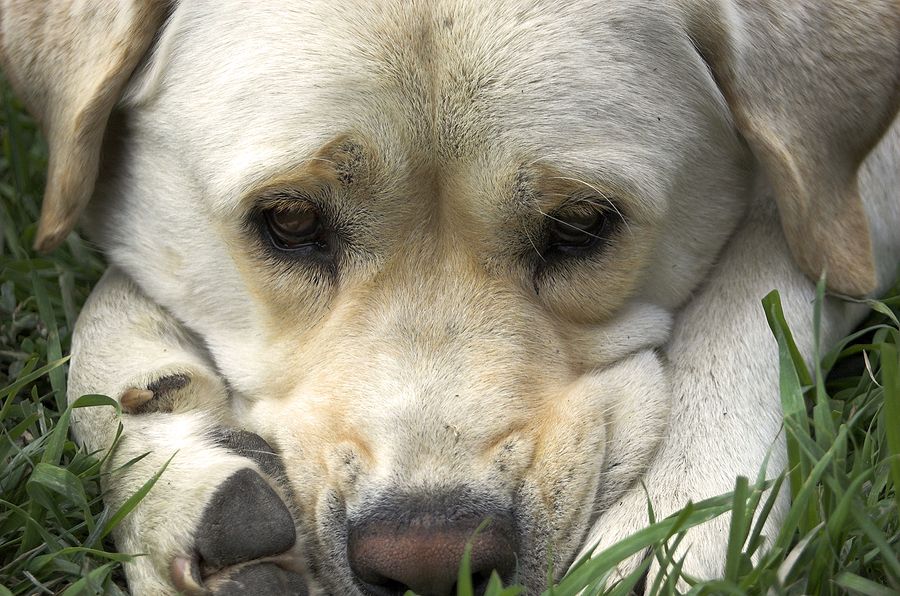How to Care for Your Dog That Has Anxiety
As with humans, most dogs can get anxious occasionally, but for some, it can become a bigger problem that leads to destructive habits or physical harm. So how can "pawrents" ease dog anxiety? When should you consider anxiety meds for dogs? What's at the root cause of separation anxiety in dogs? Here's everything you need to know about helping your uneasy companion.

What Is Separation Anxiety in Dogs?
Separation anxiety in dogs is a behavior disorder that causes pups extreme stress when left alone. Symptoms associated with this disorder may include barking or howling when you leave, excessive drooling and panting, accidents in the house, and chewing or digging.
How to Help a Dog With Separation Anxiety
If you think your furry friend may suffer from separation anxiety, fear not! You can adopt several habits to help your dog feel comfortable when left alone:
1. Exercise Your Pup
Human studies show that exercise has been linked to a decrease in anxiety. Similar to people, dogs experience a rush of endorphins after exercise, so it's safe to assume that movement can help ease their anxiety as well. Though exercise won't cure dog anxiety, it can certainly help treat it.
Before starting your dog on a workout regime, it's important to consider the pup's age and activity level. While puppies are high-energy, their bones are still developing, so it's crucial not to overexercise them. Rather than taking your puppy for a run, consider a short walk or a quick game of fetch. Full-grown dogs can handle more intense activity, but they still need to work up to longer workouts. If your dog isn't used to exercise and you take them for a three-mile run, they may get injured. Instead, start with a 30-minute walk and increase the exercise regimen as your dog builds endurance.
2. Establish a Routine
Dogs thrive off routine, and contrary to popular belief, they actually have a strong perception of time. So, when you get home late or skip Fido's afternoon walk, it can throw off their mojo and cause them to become anxious.
While folks who work in an office may have an established routine, many people with a hybrid work schedule have shifting routines that change when they work at home or the office. This can confuse your dog and make it harder for them to be alone. When working from home, try to stick with a similar routine as if you were going to the office. Walk your dog at the same time, feed them at the same time, and kennel them as if you were getting ready to leave. This will help them know what to expect each day.
3. Provide
Independent Play
To start incorporating independent play into your dog's routine, purchase a dog puzzle toy from your local pet store. Something as simple as the Kong Classic Dog Toy can be filled with peanut butter and left in a kennel for some brain work as well as a treat. If your dog devours treats quickly and needs longer-lasting mental stimulation, consider getting a larger or more durable bone that takes a while for your pup to chew through.
4. Get Prescription Anxiety Meds for Dogs
If the above methods don't work, your pup may have a more severe case of separation anxiety. In this case, it's a good idea to schedule a visit with your vet to discuss your dog's symptoms. If your vet determines that your dog does in fact have severe separation anxiety, they may recommend a prescription anxiety medication.
For dogs that are prescribed Prozac, it may take up to a month before you notice a change in your pup's behavior. If your dog doesn't respond to Prozac, don't worry. About 30% of dogs are switched from this medication to a different anti-anxiety medication like Lexapro or Zoloft. It can sometimes take a few tries to find out what prescription medication works best for your pup.
Need Help With Your Dog's Anxiety?
If you're frantically Googling "how to help a dog with separation anxiety," take a breath. While separation anxiety is hard on both you and your pup, your dog can get comfortable hanging out alone and may even grow to enjoy it with a little practice.
If you need a veterinarian's guidance to help
with your dog's anxiety, don't hesitate to reach out and schedule
an appointment with our team at
Forever Vets.



